|
|
|
Sort Order |
|
|
|
Items / Page
|
|
|
|
|
|
|
| Srl | Item |
| 1 |
ID:
076351


|
|
|
|
|
| Publication |
2006.
|
| Summary/Abstract |
In a climate of political concern about the deliberate dissemination of pathogenic micro-organisms, this article assesses the nature and scope of the threat to national security posed by actors other than states. Key factors include the motivations and disincentives for carrying out a biological attack and the technical challenges likely to be encountered by a non-state organization that decides to use disease as its weapon of choice. The assessment concludes that non-state organizations do not at present pose a great threat, that biological attacks should generally not be regarded as a 'WMD' issue, but also that the conduct of individual scientists engaged in pathogen research warrants careful monitoring.
|
|
|
|
|
|
|
|
|
|
|
|
|
|
|
|
| 2 |
ID:
108052
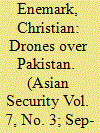

|
|
|
|
|
| Publication |
2011.
|
| Summary/Abstract |
The US government appears to be using drones to launch air strikes inside Pakistan. This article details uncertainties regarding the ethical soundness of these strikes and highlights the consequent need for greater official transparency. Available evidence is assessed in the light of traditional ethical requirements that the use of force is beneficial to a legitimate military objective, that it discriminates between combatants and noncombatants, and that it generates harm that is proportional to the expected military benefit. The murky picture that emerges is an inadequate foundation for determining whether US drone strikes in Pakistan constitute a just or an unjust use of force. Arguably, however, the very persistence of doubt on this point undermines international norms on the use of force and the reputation of the United States as a champion thereof. The US government should therefore either refrain from drone strikes or explain publicly how they are beneficial, discriminate, and proportionate.
|
|
|
|
|
|
|
|
|
|
|
|
|
|
|
|
| 3 |
ID:
152720
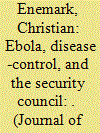

|
|
|
|
|
| Summary/Abstract |
In 2014, the United Nations Security Council (UNSC) described the Ebola outbreak then ongoing in West Africa as “a threat to international peace and security.” Resolution 2177 was the first time a disease outbreak of natural origin had been described using language ordinarily applied to political violence. This article assesses the significance of Resolution 2177 as an instrument of health governance, with particular regard to the Council’s primary aim: to bring about the lifting of state-imposed bans on travel to and from West Africa. The UNSC’s response might at first appear to have been an international-level attempt to remove Ebola from the realm of security policy for the sake of public health. However, the use of threat language in Resolution 2177, alongside the rapid mobilization of disease-control resources by some governments represented on the Council, suggests that some kind of security logic was driving the international response to Ebola. I posit that it was not the logic of securitization, based upon the use of borders as barriers to contagion, that drove UN policy. Rather, the UNSC appears to have acted according to the security logic of governmentality, whereby the health of populations (within and beyond West Africa) would be secured by facilitating cross-border circulation of medical professionals. The Council’s contribution to health governance was to support a shift in security logic: from securitization to securing circulation.
|
|
|
|
|
|
|
|
|
|
|
|
|
|
|
|
| 4 |
ID:
185826
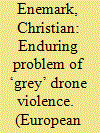

|
|
|
|
|
| Summary/Abstract |
This article addresses the problem of drone violence that is ‘grey’ in the sense of being hard to categorise. It focuses on circumstances, such as arose in Pakistan, in which a foreign government's armed drones are a constant presence. A lesson from US experience there is that the persistent threat of drone strikes is intended to suppress activities that endanger the drone-using state's security. However, this threat inevitably affects innocent people living within potential strike zones. To judge such drone use by reference to military ethics principles is to assume that ‘war’ is going on, but indefinite drone deployments are difficult to conceptualise as war, so traditional Just War thinking does not suffice as a basis for moral judgement. In assessing the US government's commitment to drone-based containment of risks emerging along its ‘terror frontier’, the article considers three alternative conceptualisations of drone violence arising in non-war contexts: vim (‘force short of war’), terrorism, and imperialism. It then rejects all three and proposes that such violence is better conceptualised as being merely ‘quasi-imperialistic’. On this basis, however, the sustaining of a drone strike campaign against a series of suspected terrorists can still be condemned as violating the right to life.
|
|
|
|
|
|
|
|
|
|
|
|
|
|
|
|
| 5 |
ID:
106772
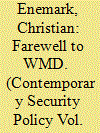

|
|
|
|
|
| Publication |
2011.
|
| Summary/Abstract |
This article critically assesses the ongoing use of the term 'weapons of mass destruction' (WMD) in policy and academic discourse. Nuclear, biological and chemical weapons are commonly lumped together as WMD, but such conflation is misleading from a technological viewpoint and renders the term vulnerable to political manipulation. There are important scientific and strategic differences between weapon types, and glossing over these leads to confusion in accurately assessing and effectively addressing threats of mass destruction. WMD-based language obscures the paramount threat of nuclear weapons, exaggerates the destructive power of chemical weapons, and is unhelpful or counterproductive when used in the context of biological weapons. In the areas of deterrence, defence, and non-proliferation, WMD-based language can mischaracterize the challenges that are uniquely associated with each weapon type, and this potentially generates adverse security consequences flowing from the implementation of inadequate or misdirected countermeasures. The article concludes that it would be both desirable and feasible to abandon the term 'WMD'.
|
|
|
|
|
|
|
|
|
|
|
|
|
|
|
|
| 6 |
ID:
091380
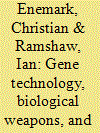

|
|
|
|
|
| Publication |
2009.
|
| Summary/Abstract |
This article addresses the security challenge posed by laboratory research involving genetic modification of microorganisms that could be applied for both benign and malevolent purposes. The authors propose that, for biological arms control purposes, a global governance culture is required to manage the security risks inherent in such research while minimizing scientific opportunity costs
|
|
|
|
|
|
|
|
|
|
|
|
|
|
|
|
| 7 |
ID:
091794
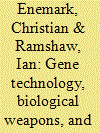

|
|
|
|
|
| Publication |
2009.
|
| Summary/Abstract |
This article addresses the security challenge posed by laboratory research involving genetic modification of microorganisms that could be applied for both benign and malevolent purposes. The authors propose that, for biological arms control purposes, a global governance culture is required to manage the security risks inherent in such research while minimizing scientific opportunity costs.
|
|
|
|
|
|
|
|
|
|
|
|
|
|
|
|
| 8 |
ID:
163176
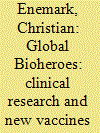

|
|
|
|
|
| Summary/Abstract |
In the pursuit of ‘global health security’, some governments advocate deployment of pharmaceuticals to combat deadly infectious diseases wherever they emerge. Following the Ebola outbreak in West Africa, attention has turned to other emerging diseases and future pharmaceutical solutions. There is growing support for enabling faster clinical research to make new vaccines available sooner. Research on experimental vaccines must ordinarily be consistent with ethical principles designed to protect human research participants. However, where a target disease is framed in security terms, it could be argued that an extraordinary response is required: exposing research participants to more risk in order to accelerate research and enable more lives to be saved pharmaceutically. This article assesses two scenarios of security-oriented research. The scenario envisaged by the Coalition for Epidemic Preparedness Innovations (CEPI) is the propelling of vaccine research through to the stage of human safety-testing before a natural outbreak of the relevant disease. Efficacy and effectiveness tests are then able to be conducted once an outbreak begins. In a hypothetical second scenario, pre-outbreak vaccine research undertaken for the sake of health security would also include efficacy-testing. This would involve the exposure to pathogenic microorganisms of healthy volunteers (‘global bioheroes’) from around the world
|
|
|
|
|
|
|
|
|
|
|
|
|
|
|
|
| 9 |
ID:
068703
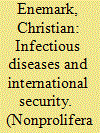

|
|
|
| 10 |
ID:
086174
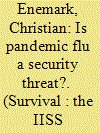

|
|
|
|
|
| Publication |
2009.
|
| Summary/Abstract |
Most infectious diseases do not attract heightened political attention because their effects are mild, they are familiar to physicians, or their geographic occurrence is limited. A particular disease might be deemed a security issue, however, when its effects impose or threaten to impose an intolerable burden on society. That burden can be measured in terms of morbidity and mortality, but also in terms of the way in which a disease is perceived by those who fear infection. The disease described by the World Health Organisation (WHO) as 'the most feared security threat' today is pandemic influenza.The next pandemic could cause illness and death on a large scale, over a wide area, in a short space of time. Such a prospect arguably sets this disease apart from the many others that may be regarded simply as health issues, and some Western governments have started to frame pandemic influenza as a threat to national security. According to the US pandemic plan, a 'necessary enabler of pandemic preparedness' is that this be viewed 'as a national security issue'. The 'National Security Strategy of the United Kingdom' assesses an influenza pandemic as the 'highest risk' civil emergency. And under the Australian pandemic plan, which emphasises 'maintenance of social functioning', Australians are to receive the best possible health care 'commensurate with the maintenance of a safe and secure society'.
|
|
|
|
|
|
|
|
|
|
|
|
|
|
|
|
| 11 |
ID:
081490
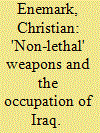

|
|
|
|
|
| Publication |
2008.
|
| Summary/Abstract |
The occupation of Iraq is a challenging task for the United States (US) military, which is considering resort to options other than lethal force as a possible just response. From the outset, the notion that a weapon can be deemed 'non-lethal' is problematic. Some weapons intended to leave their target alive often have lethal consequences and other weapons intended to have lethal effects often do not kill their target. This article explores ethical and legal challenges that arise from the potential use by US forces in Iraq of two classes of so-called 'non-lethal' weapons: incapacitating chemical agents and dazzling laser devices. Such challenges are highly relevant to questions about the role of Just War theory in the context of modern warfare. In particular, they beg the question whether the use of non-lethal weapons supports or subverts the jus in bello requirement that war be waged in a discriminate and proportionate fashion
|
|
|
|
|
|
|
|
|
|
|
|
|
|
|
|
| 12 |
ID:
114828
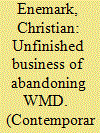

|
|
|
|
|
| Publication |
2012.
|
| Summary/Abstract |
Nuclear, biological, and chemical weapons are commonly lumped together as WMD. Such conflation is dangerous and misleading, rendering the term vulnerable to political manipulation. WMD language obscures the paramount threat of nuclear weapons, exaggerates the destructive power of chemical weapons, and is unhelpful or counterproductive when used in the context of biological weapons. In her response - the article entitled 'The Long Goodbye: Beyond an Essentialist Construction of WMD' (this journal), Michelle Bentley argues against adopting an essentialist understanding of WMD and poses the question: how do you convince political actors to discard a concept so useful to them? This reply highlights limitations to the political construction of meaning. Readers of this exchange should come away more hesitant about employing WMD language. Some might feel confirmed in their view that the political utility of this term - founded on apocalyptic vagueness - will endure for a long time. Subscribers to either perspective should agree that academics - as builders, users, and shapers of language - have a role to play in the important business of abandoning this troublesome term.
|
|
|
|
|
|
|
|
|
|
|
|
|
|
|
|
|
|
|
|
|